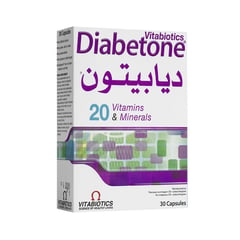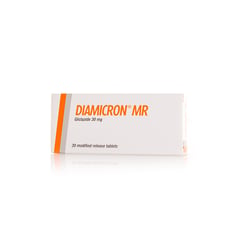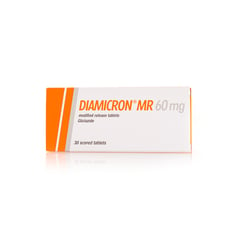Glaze 80 mg 60 Tablets

Out of stock
SKU :
1010-AR035
used to keep blood sugar at the correct level in adults with non-insulin dependent diabetes when it is not controlled by diet, physical exercise and weight loss alone.
1. What this product is and what it is used for
The active ingredient in your tablets, gliclazide, is one of a group of medicines called sulphonylureas. It is an oral hypoglycaemic agent (blood sugar lowering drug).
GLAZE is used to keep blood sugar at the correct level in adults with non-insulin dependent diabetes when it is not controlled by diet, physical exercise and weight loss alone.
2. What you need to know before you use this product
Do not take GLAZE
- If you are allergic (hypersensitive) to gliclazide or any of the other ingredients of GLAZE, to other medicines of the same group (sulphonylureas), to other related medicines (hypoglycaemic sulphonamides).
- If you have insulin-dependent diabetes (type 1).
- If you have ketone bodies and sugar in your urine (this may mean you have keto-acidosis), a diabetic pre-coma and coma.
- If you have severe kidney or liver disease.
- If you are taking miconazole (a treatment for fungal infections) (see Taking other medicines).
- If you are breastfeeding (see Pregnancy and breastfeeding).
GLAZE is not recommended for use in children.
If you have been told by your doctor that you have an intolerance to some sugars (eg glucose, lactose, galactose), contact your doctor before taking this medicinal product.
Take special care with GLAZE
Follow your doctor’s advice about diet and treatment. This is to reduce the chances of very low blood sugar (hypoglycaemia).
Make sure your doctor knows
- If you have an operation, a serious injury, fever or infection, difficulty in eating.
- If you plan a pregnancy or become pregnant.
- If you are taking any of the medicines listed in Taking other medicines.
Tell your dentist about your treatment.
Dietary advice
This medicine may cause episodes of low blood sugar (hypoglycaemia).
This is more likely if:
- You are on a strict diet.
- Your diet is poorly balanced.
- You are taking prolonged or strenuous exercise.
- You drink alcohol.
- If you are taking several medicines for high blood sugar. (See taking other medicines).
If you have low blood sugar you may have the following symptoms:
headache, intense hunger, nausea, vomiting, weariness, sleep disorders, restlessness, aggressiveness, poor concentration, reduced alertness and reaction time, depression, confusion, speech or visual disorders, tremor, sensory disturbances, dizziness, and helplessness.
The following signs and symptoms may also occur: sweating, clammy skin, anxiety, fast or irregular heartbeat, high blood pressure, sudden strong pain in the chest that may radiate into nearby areas (angina pectoris).
If blood sugar levels continue to drop you may suffer from considerable confusion (delirium), develop convulsions, lose self control, your breathing may be shallow and your heart beat slowed down, you may become unconscious.
In most cases the symptoms of low blood sugar vanish very quickly when you consume some form of sugar, e.g. glucose tablets, sugar cubes, sweet juice, sweetened tea.
You should therefore always carry some form of sugar with you (glucose tablets, sugar cubes). Remember that artificial sweeteners are not effective. Please contact your doctor or the nearest hospital if taking sugar does not help or if the symptoms recur.
While taking GLAZE you should:
− Follow a regular diet: it is important to eat regular meals, including breakfast and never to miss or delay a meal.
− Take your medicine regularly (see How to take GLAZE).
− Check your blood glucose regularly as recommended by your doctor.
If you have a family history of or know you have the hereditary condition glucose-6-phosphate dehydrogenase (G6PD) deficiency (abnormality of red blood cells), contact your doctor before taking this medicinal product.
Taking other medicines
The effect of GLAZE on your blood sugar levels may be changed by a number of other medicines.
• You should not take GLAZE with miconazole (a treatment for fungal infections).
• Make sure to tell your doctor if you are taking any of the following medicines, as special care may be required:
- Phenylbutazone (used to treat arthritis).
- Medicines containing alcohol.
- Danazol ( used to treat breast disorders, heavy menstrual bleeding and endometriosis).
- Other medicines used to treat high blood sugar (e. g. insulin).
- Beta blockers (used to treat high blood pressure).
- fluconazole (an oral treatment for fungal infection).
- angiotensin converting enzyme (ACE) inhibitors such as captopril, or enalapril (used to treat high blood pressure and heart failure).
- H2 receptor antagonists for ulcers or dyspepsia, - monoamine oxidase inhibitors (MAOIs) used to treat depression.
- Sulphonamides used to treat bacterial infections.
- NSAIDs (anti-inflammatory agents for pain relief).
- Chlorpromazine (used to treat disorders of the central nervous system).
- Steroids (for treating a number of conditions including severe asthma and rheumatoid arthritis).
- Intravenous ritodrine and terbutaline (used during labour).
- Intravenous salbutamol (for asthma).
- Anticoagulants to control blood clotting (e.g. warfarin).
• If you go into hospital tell the medical staff you are taking GLAZE.
Please tell your doctor or pharmacist if you are taking or have recently taken any other medicines, including medicines obtained without a prescription.
Taking GLAZE with food and drink
GLAZE can be taken with food and non-alcoholic drinks.
Drinking alcohol is not recommended as it can alter the control of your diabetes.
Pregnancy and breastfeeding
GLAZE is not recommended for use during pregnancy.
If you are planning a pregnancy, or become pregnant, inform your doctor so that he may prescribe a more suitable treatment for you.
You must not take GLAZE while you are breastfeeding.
Ask your doctor or pharmacist for advice before taking any medicine.
Driving and using machines
Provided your blood glucose levels are satisfactorily controlled on GLAZE, your ability to drive or use machines should not be affected.
However, if your blood glucose levels become too low, this could adversely affect your concentration, and therefore your ability to perform these tasks.
Be especially careful at the start of treatment.
3. How to use this product.
Dosage
Always take GLAZE exactly as your doctor has told you. You should check with your doctor or pharmacist if you are not sure.
The usual dose is from one half to four tablets. This depends on the response to treatment. When the total daily dose exceeds two tablets, it should be divided into two equal doses taken morning and evening.
Your doctor will tell you how much to take. All treatment for diabetes is life-long.
Method and route of administration
Oral use.
Swallow your tablets whole. Do not chew them.
Take your tablet(s) with a glass of water before a meal.
If you take more GLAZE than you should
If you take too many tablets, contact your doctor or the nearest hospital Accident & Emergency department immediately.
The signs of overdose are those of low blood sugar (hypoglycaemia) described in Section 4 Possible side effects.
The symptoms can be helped by taking sugar (4 to 6 lumps) or sugary drinks straight away, followed by a substantial snack or meal.
If the patient is unconscious, immediately inform a doctor and call the emergency services.
If you forget to take GLAZE
It is important to take your medicine every day as regular treatment works better.
However, if you forget to take a dose of GLAZE, take the next dose at the usual time. Do not take a double dose to make up for a forgotten dose.
If you stop taking GLAZE
As the treatment for diabetes is usually life long, you should discuss with your doctor before stopping this medicinal product.
Stopping could cause high blood sugar (hyperglycaemia).
If you have any further questions on the use of this product, ask your doctor or pharmacist.
4. Possible side effects
Like all medicines GLAZE can cause side effects, although not everybody gets them.
Low blood sugar (Hypoglycaemia) The most commonly observed side effect is low blood sugar (hypoglycaemia). For symptoms and signs (see Section Take special care).
If left untreated these symptoms could progress to drowsiness, loss of consciousness or possibly coma. If an episode of low blood sugar is severe or prolonged, even if it is temporarily controlled by eating sugar, you should seek immediate medical attention.
Other side effects
- Digestive disorders: Abdominal pain, nausea, vomiting, indigestion, diarrhoea and constipation. These effects are reduced when GLAZE is taken with a meal as recommended.
- Skin disorders: Skin reactions such as rash, redness, itching and hives have been reported.
- Blood disorders: Decrease in the number of cells in the blood (e.g. platelets, red and white blood cells), which may cause paleness, prolonged bleeding, bruising, sore throat and fever. These symptoms usually stop when the treatment is discontinued.
- Liver disorders: There have been isolated reports of abnormal liver function which can cause yellow skin and eyes. If you get this see your doctor immediately. The symptoms generally disappear if the drug is stopped. Your doctor will decide whether to stop your treatment.
- Eye disorders: Your vision may be affected for a short time, especially at the start of treatment. This effect is due to changes in blood sugar levels.
As for other sulphonylureas, the following adverse events have been observed: cases of severe changes in the number of blood cells and allergic inflammation of the wall of blood vessels, reduction in blood sodium (hyponatraemia), symptoms of liver impairment (e.g. jaundice) which in most cases disappeared after withdrawal of the sulphonylurea, but may lead to life threatening liver failure in isolated cases.
If any of the side effects gets serious, or if you notice any side effects not listed in this leaflet, please tell your doctor or pharmacist.
5. How to store this product
Keep out of the reach and sight of children.
Store below 30°C.
Store in the original package.
| Shipping Type | Express |
|---|
Write Your Own Review
The largest selection of casino games and sports bets at 1xbet app.






